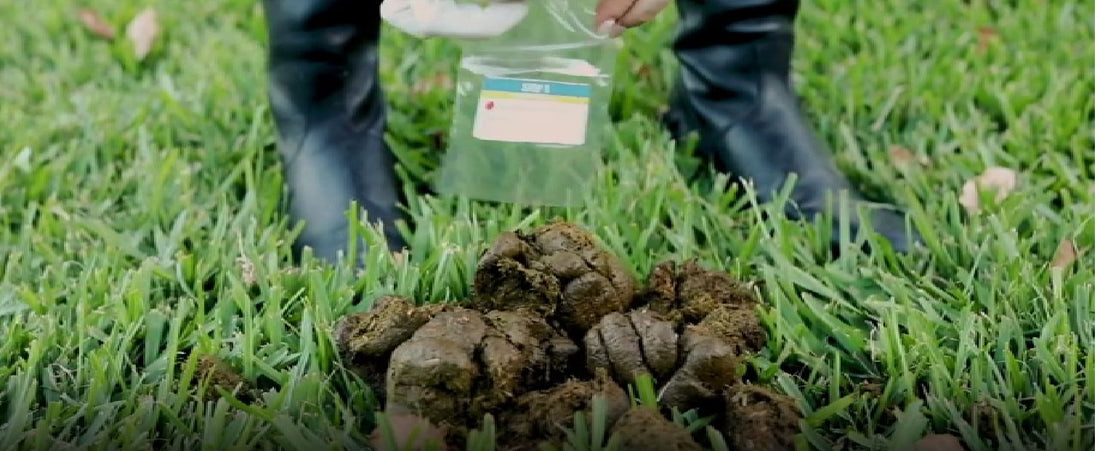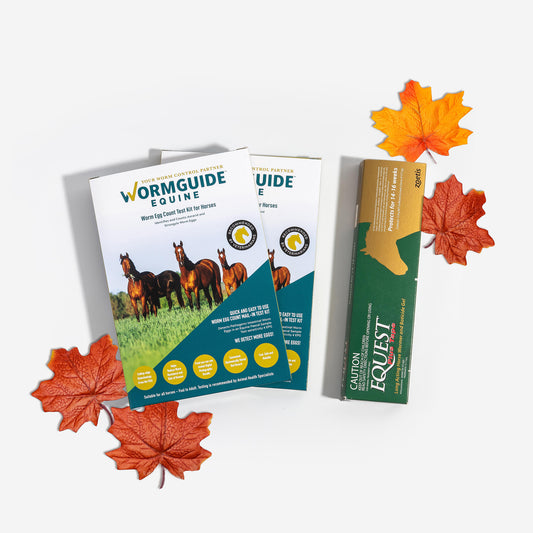There`s good reason why faecal egg counts are such a vital tool when it comes to deciding if you horse needs to be dewormed, how often, choosing the most appropriate dewormer for the type of worm present or checking that the dewormer you use actually kills the egg laying worms in your horse or herd of horses. But, with another report of ivermectin/moxidectin failing to kill worms in horses, this time in Australia, we are losing our last effective drug class against a worm all horses have – the small strongyle. The other two classes, in most cases, either don`t work or may not work well. The good news, though, is that faecal egg counts can help us manage our way around the situation and at least slow the progress of life-threatening dewormer resistance.
Scientists are studying worm resistance to anthelmintics (dewormers), and rather than rotational deworming scheduled at regular intervals throughout the year (major cause of resistance), they recommend more targeted horse worm control management solutions for a smarter way.
If best practice worm control management is not followed, the quicker resistance continues to develop, until there really isn`t an effective dewormer left. We just have to reduce the unnecessary use of worming medicines to prolong their life as much as possible.The expert advice is to design meaningful and sustainable worm control management programs that work on your property with the current dewormers for horses available.
Did you know?
Because wormers have been overused and misused for decades, and are no longer effective due to resistance, the only way to deworm your horse in most European countries is by prescription-only to encourage better and more responsible worm control management.
What is a faecal egg count?
A faecal egg count (FEC) test is performed on a sample of your horse`s manure. Using a faecal egg count kit the sample is placed in an airtight collection container to preserve the eggs. Airtight storage is critical because egg hatching is an aerobic (needs oxygen) process. After collection it is packaged and sent to be tested for worm eggs.
The analysis of your horse`s manure sample consists of counting the number of eggs –a good test should count the number of ascarid (roundworm) eggs and the number of strongyle worm eggs. The number of eggs detected, at the time of testing, is reported on an eggs per gram (EPG) basis.

What exactly do faecal egg counts tell you?
Faecal egg counts DO NOT tell you if your horse has worms, how many worms or parasitic worm disease.
Here, we share exactly what faecal egg counts tell you and how they are vital for worm control management with the help of Dr Martin Nielsen – enjoy the 12-minute video. It is super worthwhile and fun! Click here to watch
Why are we using faecal egg counts? Top 3 reasons
1. The most expensive dewormer for horses is the one that doesn't work.
Dewormer resistance! It`s irresponsible if you don`t check to find out if your horse has resistant worms. There`s a very high chance your horses have worms that are resistant to the dewormers you use repeatedly. Find out what dewormer works and go with that.
Do you really know if the dewormer you use kills the egg laying worms in your horse?
Find out with the before-treatment Super Surveillance faecal egg count Kit, and send us your horse`s poo sample for analysis. Same day deworm your horse, and 2 weeks later use the after-treatment Truth Teller faecal egg count Kit , and send us your horse`s poo sample for analysis. The two results are compared for a reduction in the number of eggs.This is a faecal egg count reduction test, wherein sensitivity, precision and superior detection of eggs are all very important.
Do you really know if the dewormer you use for your herd of horses kills the egg laying worms?
If you have at least six horses find out if the worm population on your property is resistant to the dewormer you use with the Gold Standard Resistance Detection Service. This is a faecal egg count reduction test, wherein sensitivity, precision and superior detection of eggs are all very important.
To check the efficacy of the dewormers you are using check wait times to allow previously administered deworming medications to wash out for reliable results. Little things make big things happen!
Faecal egg counts are good for herd health
 2. Knowing the type of worm is really useful and important
2. Knowing the type of worm is really useful and important
Find out the type of worm in your horse – ascarids (roundworm) or strongyle worms. Foals, weanlings, yearlings and some older horses can have ascarid roundworms as well as strongyle worms. It is best to know because there really is no safe dewormer we can choose that will effectively treat both worm types. Faecal egg counts help us choose the most appropriate deworming medicine.
Do you know what type of worm your horse is harbouring? Find out with the Super Surveillance Faecal Egg Count Kit and send us your horse`s poo sample for diagnostic testing.
Young horse worm control management is so important

A faecal egg count just before weaning at around 5 months old tells you if your foal has primarily ascarid (roundworm), strongyle worms or both to choose the most appropriate worming treatment. Don`t guess, measure!
3. Where do worms come from?
For the most part worms come from other horses and the ground. But mostly from other horses.
Find out which horses are the 20% of horses that are shedding 80% of all the eggs onto pasture. These horses are responsible for the infection pressure – they spread worm eggs infecting their pasture-mates. High egg shedders always have high faecal egg counts!
The recommendation for worm control management is to deworm all horses twice a year with the basic foundation deworming every 6 months in spring and autumn.
Make sure the high egg shedders are given one or two additional deworming treatments during the year.
Have you got a high egg shedder in your herd? Find out with The Super Surveillance faecal egg count Kit and send us you horses` poo samples for diagnostic testing.
Who is the high worm egg shedder in this herd?

A few really important things to know
-
The numbers of eggs per gram (EPG) of faeces DO NOT CORRELATE with the number of worms present in the digestive tract of your horse.
-
One way to get to know the worm egg shedding pattern of your horse is to monitor their faecal egg counts. Do this 3-4 times over the first year and you`ll develop a good feel whether your adult horse (over 3 years) is a chronic high shedder, low shedder or in between. Research has shown that adult horses tend to have fairly consistent egg shedding patterns for most of their life – so a high shedder is usually always a high shedder.
-
A faecal egg count detects egg-laying adult worms to guide your deworming decisions. However, because the immature harmful larval stages of intestinal worms inside your horse don`t lay eggs yet, a basic foundation deworming for ALL horses with the right dewormer, despite their faecal egg count numbers is recommended in spring and autumn (every 6 months) for worm control management.
Timing is key for effective worm control management – Autumn is coming.
Autumn is peak time for basic foundation deworming for all horses

WormGuide Autumn Advantage Set is available for your convenience and includes 1 x Super Surveillance Test + 1 Truth Teller Test + 1 x horse worming product (based on guidelines).
Test
- Monitor egg shedding level
- Reveal worm type
Treat
-
Tapeworm, harmful larval stages of ascarid (roundworm), encysted small strongyles, small strongyles, prevent dangerous large strongyles (bloodworms)
Check
-
Test again - check efficacy of appropriate worming product, compare the two results - did it kill the egg laying worms? Can you continue using the wormer?
Now For A Bit About Us
We are on a mission to provide Australia with the best faecal egg count (FEC) service available and committed to staying up to date with the latest research in worm control management, so that we can continue to deliver the very best for your beloved horses.
The best faecal egg count Kit in Australia
We`ve created a convenient and user-friendly faecal egg count Kit and are proud to offer the most precise and reliable egg counting technique available.
Take control with your eco-friendly faecal egg count Kit
- Everything you need for sanitary sample collection
- Easy 1-2-3 step collection instructions
- Zero airflow double-layer sample protection system
- Faecal Sample Submission Form
- Recyclable wheat fibre and cardboard pen
- Product Guide and how to use instructions
- Recyclable Prepaid Express Post Mailer
- High precision faecal worm egg count diagnosis
- Convenient digital results email
- Absorbent pads
- Photographic evidence of the eggs (or absence of eggs) in your horse’s faecal sample
- Customer-only access to the What Do My Results Mean? Guide to help you make positive changes to your worm control management approach (RRP $124)
Sample shipping complies with Australia Post Biosecurity Guidelines
WormGuide: Australia`s premium faecal egg count Kits and performance faecal egg count testing that make a difference
Are you ready to make worm control management decisions based on actual evidence?
Worm control management without faecal eggs counts is like driving blindfolded: you just have no clue what you are doing.
To help support your decisions WormGuide`s amazing What do my Results Mean? Guide is included with your horse`s faecal egg count result.
And if your veterinarian isn`t available to help interpret results or support your transition to the up to date meaningful and sustainable best practice worm control management, you can turn to our expert veterinarians in equine parasitology and epidemiology through our telehealth vet consultancy service for WormGuiders.
Choose the faecal egg count that has superior scores for precision and sensitivity. It`s the only way forward! Order today.











